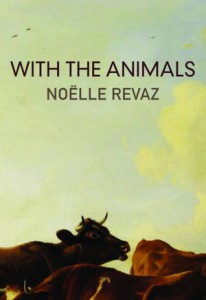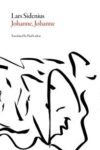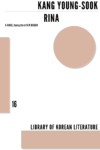We are beasts: in our desires, in how we move through the world, in how we relate to our environments and the people around us. I am intrigued by fiction in which the line between people and animals is deliberately blurred, in which the façade of human civility is eroded. With the Animals, written by Swiss writer Noëlle Revaz and translated by W. Donald Wilson, is one such book, merciless and unwavering in baring the animal nature of the human race. This is a novel that tells a familiar story — that of a brutal marriage — in a shocking but strangely refreshing manner. You will not find trite melodrama or rehashed themes. With the Animals does not have a traditional sense of plot, diction, or characterization, but the story presented is nonetheless fully and brilliantly realized.
The premise is horrifying and inescapable. A man, Paul, who relates more to animals than to other people, is married. He calls his wife, Vulvia, “that stupid lump of a Vulva.” Paul is brutal, thinking so little of his wife as to try to erase her identity completely. He dismisses the woman she was before she met him and hardly considers the woman she has become to be worth his time and attention. Paul is a man who seems as confused by his wife as he is repulsed by her. The couple also has children, but how many is unclear. The children are mostly an indeterminate mass of youth — the “young ones” Paul calls them, because he cannot be bothered to know their names.
Early in the novel a new farmhand, George, comes to work the farm. At times, Paul welcomes the companionship. At other times he is paranoid George is trying to encroach upon his domain. What we really see is how George is sensitive to Vulvia’s plight and how he attempts to help her. He tries to teach Paul to be a kinder, gentler, and more affectionate husband.
The extent of Paul’s brutality reaches far: to how he speaks to and of his wife; to the way he beats her and rapes her; and to the cruel psychological games or “exercises” he uses to test her. When talking about how he treats his wife, he says:
It’s like the animals: when they’ve seen what a stick is for they think twice before they misbehave, and that’s the way to handle them, giving them to remember and respect the master.
Revaz is unrelenting in what she reveals about this man and this marriage, and the prose takes on a dense and overwhelming, if not suffocating, quality that mirrors what is being conveyed.
And still Revaz makes it possible to feel a certain empathy for Paul, a pity for how small he has made his world and how tightly he needs to control it. He harbors great affection for the cows he tends — unlike his children, he names the cattle, speaks to them, and takes special care to deliver the calves. There are also moments when he remembers his wife’s beauty or has a semblance of a kind thought about her. Paul has a heart even if he is not certain of how to use it.
One of the most intriguing aspects of With the Animals is the narration: both its unreliability and the rough, awkward dialect Paul uses. Even in his diction, Paul is not quite human. This dialect and the inconstancy of the narration obscure as much as they reveal. The narrative style is reminiscent of Emma Donoghue’s Room, and it is only through the main characters’ interactions with others that we get a clearer sense of the dynamics between them, as well as of the gravity of their confined circumstances.
Paul’s outlook is so darkly warped it is hard to know what’s real and what’s a figment of his narrow, repugnant perspective. A doctor comes to visit Vulvia because she has a tumor in her belly. Paul observes:
But Vulva she carries on with the play-acting, digging up vocabulary I’ve no clue where she gets it, and she even puts on a little false pitiful voice: she yarns that her husband never treats her right and she’s had enough on this farm, and she starts up her complaining, but the doctor he goes back to ferreting out about the husband.
Paul is unable to understand that his wife is human: capable of intelligent thought and conversation; capable of desires he has not ordained. Paul struggles with this realization time and again, shaping the novel’s primary tension. Paul grapples with his humanity, his wife’s humanity, and the consequences of being human.
At the end of the novel, Paul and Vulvia sit together. Paul places his hand on his wife’s shoulder. With another couple this could be a tender moment. But in this novel the gesture is not enough. With the Animals is not about a man growing into someone better, even though Revaz compels us to want him to. What makes this novel so remarkable are the fragile, fleeting moments when, despite everything we know, we hope a man can become more than an animal.
This post may contain affiliate links.








